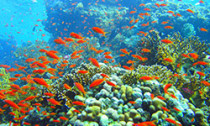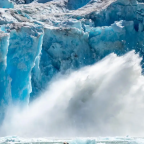
Reef corals in equatorial regions are going to start moving toward the poles as climate change takes hold, scientists have said. By analyzing the ranges of reefs from the fossil record, researchers are able to build a picture of how these systems respond to climate change—and then project how they might respond under future global warming.
Findings show that, under two climate change scenarios set out by the Intergovernmental Panel on Climate Change (IPCC), reefs are likely to expand their poleward range—in both the Northern and Southern hemispheres—and decline in the regions they currently occupy. This will mean a fundamental change to the locations of reef corals in the future.
The study, published in the journal Royal Society Open Science, examines the fossil record for how organisms respond to different climate states over vast timescales. Looking at the last period of global warming—the Last Interglacial, around 125,000 years ago—researchers found that reef corals moved toward the poles as oceans got warmer.
They then used a modeling system to generate a global map of suitable habitats for reef corals under different climate scenarios—one where global temperatures rise by between 1.1 and 2.6 degrees Celsius and another where it increases by between 2.6 and 4.8 degrees Celsius. The latter is essentially the IPCC’s worst-case scenario for future climate change.
Models showed that reef corals—which are the building blocks of coral reefs, sort of like trees in a forest—were greatly affected in the equatorial regions, and this appears to be driven by sea-surface temperatures. The team predicts that a substantial number of habitats suitable for reef corals will be lost as a result of warming.
Study author Lewis Jones of Imperial College London said the move toward the poles in some species is already taking place. “We will almost certainly see a decline in reef ecosystems in equatorial and tropical regions in the near future,” he told Newsweek. “Over longer timescales, we may well see the establishment of reef ecosystems at higher latitudes as we observe in the fossil record.”
He said studies and real-world observations—like major bleaching events—show that coral reef ecosystems are being negatively affected by global warming. However, evidence showing how reef corals will react in the future has been lacking.
“Global warming is happening,” he said. “As a society, we need to understand how species and ecosystems will respond to such change and how we can best negate the negative impacts but also prepare for them.”
Jones said some species are now on the move to get away from the warmer water, but whether others will be able to keep pace with the rapid rate remains to be seen. Discussing the future of reef corals, he said the next few decades will likely see a huge decline in biodiversity.
“On the century scale, our models show that if we don’t take action to reduce global warming, we could lose most of the suitable habitats in equatorial and tropical regions,” he said. “As a palaeobiologist, I like to think coral reef ecosystems would bounce back on longer timescales as they have done in the past, perhaps occupying higher latitudinal distributions in a warmer world.
“However, the rate of change we see today is quite unprecedented in geological record, so without proper conservation efforts and reduction in greenhouse gas emissions, some might say I am dreamer,” Jones said.












Social Profiles